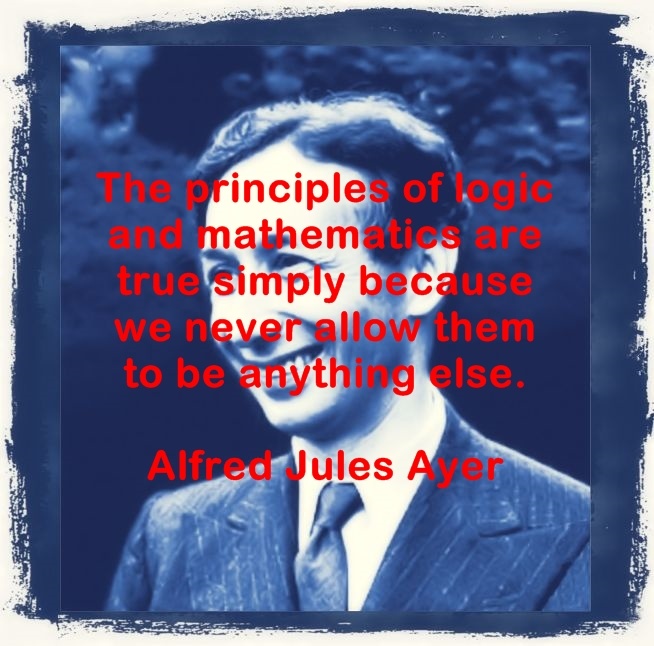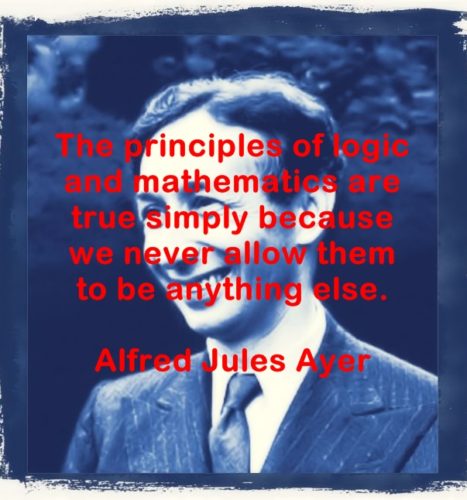
Language, Truth and Logic by Alfred Jules Ayer, a very short summary text with a glossary, plus some very interesting quotes about language and thought.
Philosophy is a battle against the bewitchment of our intelligence by means of language.
Ludwig Wittgenstein
To understand a sentence means to understand a language. To understand a language means to be master of a technique.
Ludwig Wittgenstein
It is not humanly possible to gather immediately from it what the logic of language is. Language disguises thought.
Ludwig Wittgenstein
All philosophy is a ‘critique of language’ (though not in Mauthner’s sense). It was Russell who performed the service of showing that the apparent logical form of a proposition need not be its real one.
Ludwig Wittgenstein
The traditional disputes of philosophers are, for the most part, as unwarranted as they are unfruitful.
Alfred Jules Ayer
The principles of logic and mathematics are true simply because we never allow them to be anything else.
Alfred Jules Ayer
No moral system can rest solely on authority.
Alfred Jules Ayer
Introduction to Language, Truth and Logic by Ayer
Round about 1920 a gang of philosophers including Rudolph Carnap and Kurt Godel started meeting in Vienna. This so-called ‘Vienna Circle’ dedicated themselves to reconciling philosophy with the new sciences and so determined to take it upon themselves to evaluate truth solely in terms of the empirical verifiability or logic of language. This was the school of ‘Logical Positivism’, and it was AJ Ayer who is chiefly remembered for popularising it in England.
His Language, Truth and Logic, first published in 1936 presents a modified version of logical positivism which he called ‘logical empiricism’. This made rather radical charges against philosophy itself, such as asserting that metaphysics was simply nonsense, that questions of value were nonexistent and that philosophers should concern themselves almost solely with language.
All very interesting, and presented by Ayer in such a confident manner that it is easy to miss the fact that it might not actually be reasonable. On the one hand his dismissal of metaphysics doesn’t mean that other philosophers are prevented from metaphysical enquiry, and on the other hand by raising language to the status of a sort of knowledge above and beyond that which is experienced he could be accused of treating it as a form of metaphysics.
In fairness, as he explains in his introduction to the 1946 edition (included here) Ayer himself realised many of the shortcomings of Language Truth and Logic. Then again, to declare oneself an out-and-out supporter of Ayer is to be left with such an emaciated version of ‘philosophy’ that it shouldn’t be too difficult to become an expert in it.
A very short summary text
We reject metaphysics and knowledge of a transcendent reality.
Kant accused metaphysicians of ignoring the limits of understanding, we accuse them of disobeying the rules of significant language.
For a statement of fact to be genuine it must be possible to verify it through experience.
Philosophy is wholly critical, an activity of linguistic analysis.
Philosophy is not concerned with meaning, but with definitions in use.
As empiricists, we deny that matters of fact can be known to be certainly valid.
Analytic propositions (tautologies), such as logic and mathematics, are true and can give us new knowledge by bringing to light our linguistic usages.
The words ‘true’ and ‘false’ are simply signs of negation or assertion.
The ‘problem of truth’ is the problem of how propositions are validated.
Observation can discredit not just a hypothesis, but a whole system of hypotheses.
But the ‘facts of experience’ can never compel one to abandon a hypothesis.
Assertions of value are not scientific but ‘emotive’, thus neither true not false. They express feelings or commands.
On this view it is impossible to dispute questions of value, only questions of fact.
Ethics and aesthetics are to be comprehended in the social sciences.
That a transcendent god or an immortal soul exist are metaphysical assertions of no literal significance.
This view is, in fact, supported by theists.
A sense-experience cannot belong to the sense-history of more than one self.
The ego is fictitious.
We know of other minds in the same way we know of our own, by inference from the body.
What exists need not necessarily be thought of.
Philosophy is the logic of science.
Glossary
Philosophy: The ‘handmaiden of science’, the wholly analytic business of identifying ‘definitions in use’.
Definition: In philosophy, a the translation of a statement into an equivalent statement of ‘definition in use’ to test its veracity; unlike dictionary definitions.
Metaphysics: Meaningless nonsense caused by misunderstandings of grammar.
Verification: The business of determining whether a proposition is meaningful or not. If it could, even if only in theory, be verified by observation then it is meaningful.
Strong Verification: Where a proposition is rendered certain
Weak Verification: Where a proposition is only rendered probable.
Basic Propositions: Information held in the mind about a single experience and therefore incontestably verified.
Deduction: The inference of specific events from known rules.
Induction: The inference of general rules from known events.
Material Things: Logical constructions out of sense-contents.
Empiricism: The belief that all knowledge is derived from experience.
Tautology: Repetition of the same information in such a way as to give the impression that something new has been discovered. Tautologies are necessarily true. Mathematics is a tautological system, but can still be surprising because it deals with such a large system.
A Priori: That which is known to be true, independent of experience.
Emotivism: The utterance of statements indicating the speakers emotional state.
Here you can download the e-book
About the language matter you can also read:

